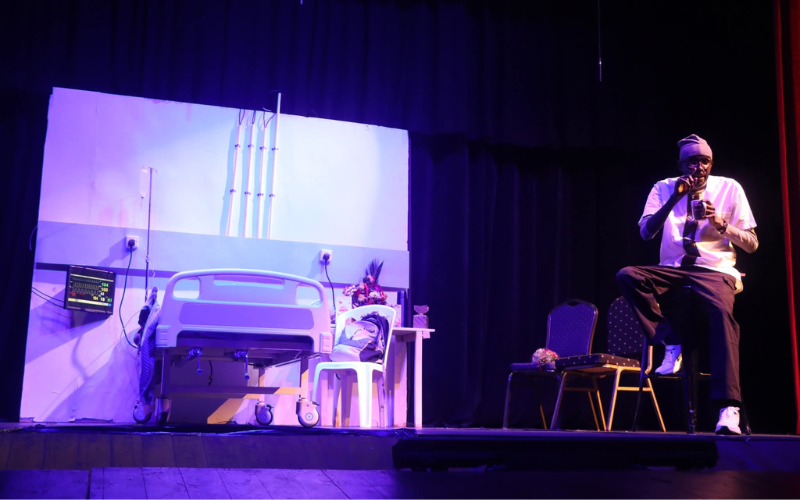In Tea with My Father, veteran Kalasha-winning actor and playwright Gitura-Kamau stands alone on stage, confronting the weight of a strained relationship between him and his dying father.
The one-man play, staged on October 29 at the Kenya National Theatre, follows Muchiri Koome, a middle-aged man who returns home from South Africa after learning that his father is on his deathbed.
His father lies in a coma, unresponsive, and Muchiri is torn between bidding farewell and confronting him for being a distant parent. The play unfolds in the ICU ward, where Muchiri speaks into the void of paternal absence and wrestles with grief, memory, masculinity, and the unspoken conflicts between fathers and sons.
“My father and I are close, but I’ve seen how strained relationships between fathers and sons can be. I have friends who can’t even spend time with their fathers. It’s an epidemic that people don’t talk about,” Gitura-Kamau shares.
He spoke with people about their relationships with their fathers, and out of thirteen interviews, eight said they had problems with their fathers—affirming to him that the story needed to be told.
The idea for Tea with My Father came as he was transitioning from film to theatre. He believes that performing actors are best sharpened in theatre—where his journey began in 1992.
“I wanted to start with something that felt honest. When I thought of this story, I shared it with my peers. It became clear that many people are affected by it,” he says.
The title is intimate—Gitura-Kamau imagined sitting down with his father over tea, just the two of them having a candid conversation about life. He hopes the play will inspire people to go back home and have those intimate conversations with their fathers.
While the theme could have unfolded through dialogue, Gitura-Kamau chose to tell it alone.
“The father is in a coma, so there’s no back-and-forth argument. It’s one man releasing what he has bottled up for years because of not having a good relationship with his father. One-person plays allow for reflection,” he says.
The play runs for 65 minutes, told entirely through Muchiri’s voice. Staying true to traditional theatre, he performs without a microphone. He explores the darkness and depths of emotional battles surrounding paternal absence, revealing that the play is meant to unsettle audiences while also offering a sense of peace.
Portraying Muchiri demanded introspection and believability. At first, Gitura-Kamau thought the character should be younger, but he settled on one who is the same age as himself.
“I am 52 years old, and I wanted authenticity. I believe actors should depict characters their age and bring sincerity to the stage instead of trying to look a certain age to fit the story,” he says.
He describes preparing for the role as an act that demands his whole being. He has been unwell and is on a recovery journey, yet he felt compelled to do this play. His artistic path began in 1992 with Theatre Workshop Productions, where he worked on theatre for development and education before moving into film and television.
For Tea with My Father, he collaborated closely with his director and long-time friend Simiyu Barasa. The two previously worked together on the 2019 film Family Meeting, and they hold deep respect for each other’s artistry. When Barasa first read Gitura-Kamau’s script, he felt its emotional weight.
“So many people have anguish when it comes to their fathers. Men and their fathers don’t generally communicate deeply until it’s too late. When I read it, I thought, ‘Here goes another one,’” Barasa says.
His directorial vision was minimalist, allowing the actor to perform truthfully. Rather than focusing on what the audience would see or like, Barasa wanted Gitura-Kamau to fully embody the role. He sought to explore the tension between masculinity and vulnerability in father-son relationships.
Working with a single actor also required careful pacing to sustain the performance’s emotional energy, given how demanding one-handers can be.
Barasa, best known for his film work, had not directed for the theatre in twenty years.
“It’s easier when you’re working with an actor like Gitura-Kamau. He’s one of the best actors we have in the country, with the range and sensitivity to portray deep conflict,” he says.
The play’s themes—grief, masculinity, reconciliation—resonate strongly in African contexts, where father-son relationships are often defined by stoic traditions. Barasa sees the play as a challenge to those norms and to prevailing ideas of manhood.
“Heart-to-heart conversations between a father and a son rarely happen. It’s considered unmanly for both of them—but it leaves emotional scars,” he says.
